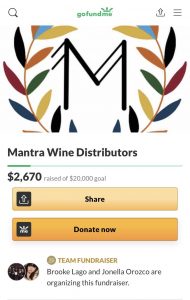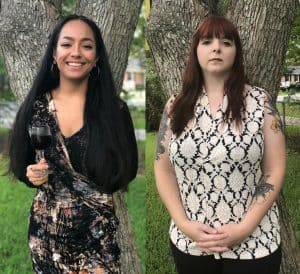There’s been a lot of talk lately about the need for change and diversity in the wine industry.

From Mantra Wine Distributors’ GoFundMe page.
Many folks have stood up to put that change into action–most notably Julia Coney’s Black Wine Professionals resource page and DLynn Proctor, Martin R. Reyes MW & Mary Margaret McCamic MW’s Wine Unify mentorship platform. However, there’s so much more that still needs to be done. The obstacles in the wine industry that hinder the growth of BIPOC are omnipresent and systemic.
Tweets, likes, shares and changing profile pics are nice gestures. But unless there are deliberate actions behind them, they’re just another dressing of “thoughts and prayers.” The digital equivalent of changing the label of a syrup bottle while ignoring the sticky mess inside.
Supporting change means enacting change.
Now there are a lot of different ways to do this, the easiest of which is simply patronizing minority-owned businesses. But, especially in the US, there are barriers that make that difficult. The archaic laws that litter the American three-tier system often suffocate direct-to-consumer options. While, thankfully, those cobwebs are being swept away one by one, the main route to new markets for many wineries or distilleries is still through distributors and wholesalers. And for small wineries, that route is often strewn with roadblocks.
Decades of consolidation have dramatically shrunk the number of distributors that small wineries can turn to. While the US wine industry grew more than fivefold from 1,800 wineries in 1995 to over 11,000 wineries in 2020, the number of distributors available to represent these brands dropped from 3000 to just 1200. Plus, there are thousands of producers from more than 60 other wine-producing countries that are also vying for spots in these limited portfolios.
But as stark as these barriers are for the typical small winery, they’re only magnified for wine & spirit brands owned by minorities.
In the Washington Post, Chanel Turner of Fou-Dre Vodka in Washington, DC, recounted her challenges in finding distribution noting, “I would set up meetings with different distributors, and they weren’t expecting to see someone like myself.” Likewise, Robin McBride of McBride Sisters Wine points out in VinePair that the struggle begins with just getting access to the “gatekeepers” in the first place.
So what are we going to do about this?
How can we, from regular consumers to industry folk, enact meaningful change to help minority-owned brands gain access to consumer markets?
Well, for one, we can put pressure on the Top 10 distributors that dominate the American wine market–all but one of which seems to be led by white men. As gatekeepers, they wield enormous influence on what wines consumers see on the shelves and wine lists of their communities. Sure, several of them put out statements about Black Lives Matter. A few changed their social media profile pics. But we’re going to need more than just syrupy sycophancy.
What we also need to do is support folks like Jonella Orozco and Brooke Lago.
These two young somms are working to put change into action. After many years in the hospitality industry in Charleston, South Carolina, they’ve started Mantra Wine Distributors to answer the lack of minority-owned wine brands being represented in their community.
While the full impact of COVID has yet to play out, Charleston is a thriving and emerging food and wine destination. In the Deep South, the city’s demographics are younger and more affluent than the median in South Carolina. And with nearly 40% growth in population since 2000, the potential of this market continues to expand.
But it’s not going to be easy. Impactful change never is.

Jonella Orozco and Brooke Lago of Mantra Wine Distributors
Orozco and Lago know they have their work cut out for them. It takes a lot of capital to start a wine distribution company. And it takes a lot of heart to do it in the middle of a pandemic. But heart and hard work is something that both these women have in spades.
While other folks are changing syrup labels, they want to change their community. They want to bring to Charleston wines that the wine lovers and tourists there aren’t getting. They want to share the stories of the many Black, Latinx, Indigenous, LGBTQ+, Women and minority-owned brands that are waiting to be discovered. And they’re willing to put in the time, sweat and tears to make that happen.
The wine industry needs more folks like Jonella Orozco and Brooke Lago. We need more people willing to chip away at the barriers which limit access, availability and opportunities for minority-owned wine and spirits brands. Projects like Coney’s BWP help increase visibility and amplifies the voices of Black wine professionals while Wine Unify broadens educational opportunities. But we also need to take this fight to the retail shelves and wine lists of our communities.
Check out Mantra Wine Distributors’ GoFundMe page. Contribute, share, help them make this change happen.
If you’re in the wine business and want to help with mentorship and support, contact them directly.
Follow them on Instagram and Twitter. Spread the word and help inspire other folks to launch similar initiatives in their communities.
We’re past the point of just talking about change. Now we have to enact it.
